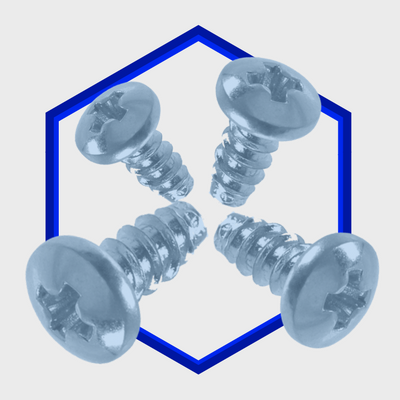Blue, Gold and Trivalent Passivation.
.png)
.png)

Zinc Plating is always accompanied by a passivation process and often this will have a colour associated with it. The difference between these colours and what exactly they are specifying can be a little confusing so here is a quick guide to some often misunderstood terms.
Blue Passivate
Most often when a drawing specifies ‘Blue’ they are most often actually referring to a Natural or Clear Finish. Any Passivation process will affect the colour of the component and there is no such thing as a completely clear or colourless finish. Natural Passivate instead has a very light and iridescent blue colour. This isn’t strong enough to be instantly identifiable as Blue and certainly not as strong a colour as say, the sky. If you wished to have parts Zinc Plated that were identifiably blue, then we could add a dye into the process to achieve this. Natural Passivation provides a good level of corrosion resistance for its cost.
Gold Passivate
Gold Passivate is just another name for Yellow Passivate. Although it has Gold in its name, this process contains no actual Gold and is simply referring to the colour which can actually be a darker tone of yellow. Traditionally the colour of the coating was an indication of the amount of Hexavalent Chromium in the makeup of the solution and a ‘Stronger’ colour would in theory perform better, this may be one of the other reasons that companies specified Gold as opposed to Yellow. Yellow Passivates are most popular in the automotive industry for components such as Brake Calipers and Yellow Passivate provides better corrosion resistance than it's clear counterpart.
Trivalent Passivate
Last but not least, we are seeing more and more drawings specifically asking for Trivalent Passivate that people may be unfamiliar with. The standard Passivation process that would take place in conjunction with Zinc Plating essentially converts the surface of the metal into a mixture of Chromium compounds which then oxidise into a barrier layer. This process utilises Hexavalent Chromium (cr6), and the issue with this is that it is a known carcinogen and is a restricted substance under RoHS. As such new processes that utilises Trivalent Chromium (cr3) instead have been developed. In terms of visual appearance, Trivalent Passivates are a light blue colour, perhaps a little stronger in palette than a Natural Finish.
Silchrome Plating provide Clear, Yellow, Black, Olive Drab and Trivalent passivates in conjunction with our Zinc Plating. We are fully ISO 9001 and 14001 accredited and based in Leeds, West Yorkshire.




